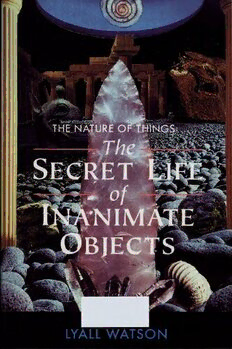
Nature of things - the secret life of inanimate objects PDF
Preview Nature of things - the secret life of inanimate objects
THE NATURE OF THINGS: The S L ecret ife of I nanimate O bjects THE NATURE OF THINGS: The S L ecret ife of I nanimate O bjects LYALL WATSON Destiny Books Rochester, Vermont Destiny Books One Park Street Rochester, Vermont 05767 Web Site: http://www.gotoit.com Copyright © 1990, 1992 Lyall Watson All rights reserved. No part of this book may be reproduced or utilized in any form or by any means, electronic or mechanical, including photo- copying, recording, or by any information storage and retrieval system, without permission in writing from the publisher. Library of Congress Cataloging-in-Publication Data Watson, Lyall. The nature of things: the secret life of inanimate objects / Lyall Watson. p. cm. Originally published: London: Hodder & Stoughton, 1990. Includes bibliographical references and index. ISBN 978-0-89281-408-4 1. Parapsychology—Case studies. I. Title. II. Title: Inanimate objects. BF1031.W385 1992 133-dc20 92-19457 CIP Printed and bound in the United States 10 9 8 7 6 5 Destiny Books is a division of Inner Traditions International To Charles Fort student of the strange, who spent his life collecting reports of the unusual and, in four impish books, deposited thousands of these inconvenient foundlings on the doorstep of science. His work goes on. Forteans in many countries continue to compile records of events which elude reasonable explanation, adding to their founder’s gallant attempt to prevent reality from being too narrowly defined. I am grateful to the British chapter of this defiant non- organisation which publishes the Fortean Times and, in particular, to its editor Bob Rickard who raided his journal’s archives on my behalf. L.W. Acknowledgment The author is grateful to Grafton Books, a division of the Collins Publishing Group, for permission to quote a poem by ee cummings. Contents Introduction The Thing Is . . . 9 1 The Nature of Things 17 Homing things – Naked genes – Living stone - Crystal clarity 2 The Origin of Things 42 Inventing things – Organic bridges – Mind measures – Earth magic 3 Taking Things Seriously 67 Great notions – Mother Earth – Metal magic - Transformation 4 The Social Life of Things 90 Social notions – Things of value – Things of power – Things of moment 5 Things Like Us 116 Graven images – Face value – Reflections - Effigies 6 From Things to Machines 145 Darwinian things – Marking time – Moving things – Automagic 7 The Ghost in the Machine 180 Loose limbs – The backlash – The body electric – Knowing things Conclusion . . . and Another Thing 221 Sources 231 Index 245 Introduction The Thing Is . . . . . . that we have a problem. We have broken the mould. Humans have, by taking thought, found ways of adding considerably more than one cubit to their stature. It started simply, perhaps with a crystal or a tool, but it was not long before our bodies became embellished with an astonishing array of new appendages, organs designed to meet every need. ‘Observe’, said Samuel Butler: a man digging with a spade. His right forearm has become arti- ficially lengthened, and his hand has become a joint. The handle of the spade is like the knob at the end of the humerus; the wooden shaft is the additional bone, and the oblong iron plate is the new form of the hand which enables its possessor to disturb the earth in ways to which his original hand was unequal.32 * We have freed ourselves from the constraints of organic evolu- tion and become instead part of a different, very much more rapid, evolutionary process. Tooth and claw have been reinforced with blades and missiles, hide and hair with extraordinary organs such as coats and umbrellas. We alter our shape and appearance to suit the age and season and extend and magnify our senses on demand. We have developed limbs which, instead of being attached to our bodies, lie loose about the world. And our access to them is limited not so much by natural ability as by accidents of birth and wealth. We possess, as a result, an extraordinary * Numbers refer to the Sources listed on page 230. 9
